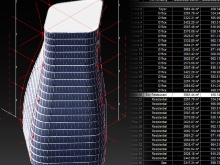Building Information Modeling (BIM)
Integrative Fabrication Strategies in Architecture
The building sector and architecture, in particular, is undergoing fundamental changes through the cross-linking of digital technologies. Contemporary software packages give architects and engineers the possibility to design and realize complex building projects. Different layers of information such as geographic information, daylight analysis, quantity take-offs, cost control and energy usage are directly related and therefore constitute essential parameters for the design and planning process. The complexity and density of information accumulated over the course of a project and the management of such information constitute a major challenge demanding innovative solutions.
Building Information Modeling (BIM), i.e. building component-oriented planning methods, offer the opportunity to aggregate and coordinate all relevant information in a virtual parametric model. Consequently, BIM represents the logical evolution from digital models of representation to planning instruments that are able to comprise the entire life-cycle of a project.
This seminar aims at giving an introduction into the fundamentals of information models and at becoming familiar with their potential for the design and planning process. The focus of the course is on the examination of BIM on a theoretical level by means of project specific considerations as well as practical experience by means of tutorials.
No prior knowledge required.


